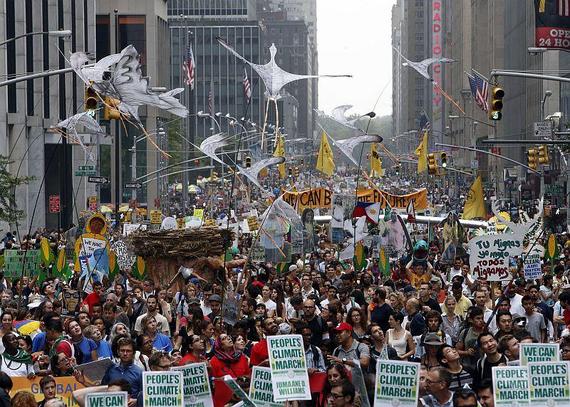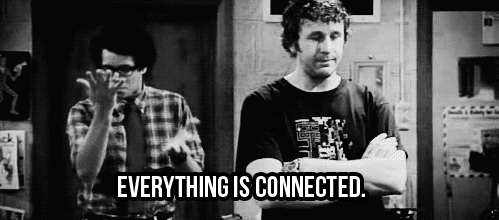The United Nations Climate Summit begins this week, and many of the marchers who flooded the streets of downtown New York came representing a multitude of faith traditions. Churches and church leaders journeyed from around the country to take part.
In honor of the climate summit, I thought it would be fun to celebrate a few of the thinkers who brought environmental consciousness to mainline Christian theology. In other words, stuff I bet those marching pastors were reading. And, because I figured it was time I learned to use GIFs, I used GIFs. Apologies in advance for irreverence or mild inaccuracy in the pursuit of brevity.
Here goes.
In 1962, Rachel Carlson's landmark book on ecology, The Silent Spring, raised the profile of environmental concern by establishing the very real threat of environmental pollution. Carlson argued that because ecosystems are deeply connected, pollution reverberates through the planet. Human beings are in deep trouble.
At the same time, the Cold War stockpiling of nuclear weapons meant that human beings now possessed the firepower to blow up the world, many times over.
This got many theologians to thinking. When human beings have the potential both to trash the planet or bomb it into oblivion, what does this mean for talking about God? Moreover, what does it mean to talk about creation?
Theologians like John Cobb argued that theology has been far too focused on human beings. We worry about our salvation while pretending that it's not dependent on our relationship to a healthy planet.
Cobb reminded Christians that the biblical creation story starts with just that -- creation, not people. People are part of creation. Both creation and people are part of God.
And if things aren't going so well with creation, then things are not going so well with God. So we humans need to get it together.
A bit later, a feminist theologian named Sallie McFague decided to take Cobb's ideas even further. She argued that we need new ways of talking about God altogether -- ways that can tell the story of a God who is always part of creation. For McFague, this means Christians need to let go of some ideas.
For one, it's time to stop talking about having dominion over the earth. We are part of the earth, and the earth is part of us. We are vulnerable to the negative effects our actions have on our environment. When we hurt the earth, we hurt God. And we hurt ourselves. God is working to influence how we relate to the world. But we have to get on board.
Additionally, we really, really need to stop thinking of ourselves as consumers. The earth is not a buffet of natural resources for us to gobble up. And we were not created to be gobblers.
Instead, we need to think of ourselves as creatures, part of a larger ecosystem and dependent on it for our survival.
In McFague's model, God is the creator, but we need creation to relate to God. Pretending we are masters of creation is offensive and sinful. We are part of creation too, and we depend on creation for survival.
Finally, McFague suggests that God is not exactly in charge of the earth either. Instead, God chose to be part of creation. In Christianity, that's the story of Jesus. God choosing to give up being separate from creation.
So Christians must talk about the environment if they want to talk about Jesus.
Now, here's where I think "ecotheology" gets especially interesting. Other theologians, like Karen Baker-Fletcher and Delores Williams, describe how "owning" or "dominating" the earth has a lot in common with owning or dominating other groups. A small percentage cannot control the systems and resources we all need for survival. You know who I'm talking about.
Women, people of color, and developing nations disproportionately bear the brunt of climate change and environmental injustice. Theologians like Williams and Fletcher connect calls for social justice to environmental justice. Healing one requires healing the other. Faith communities who want to address racism, sexism, and economic inequality also need to talk about environmental issues. And faith communities who talk about environmental issues also need to talk about racism, sexism, and economic inequality.
So there you go. These Christian theologians join powerful voices from across the world's religions, including Judaism, Islam, Buddhism, Hinduism, pagan, and secular humanist traditions. We're all connected, and the coming challenges of climate change mean we're going to need each other.

